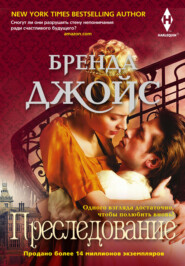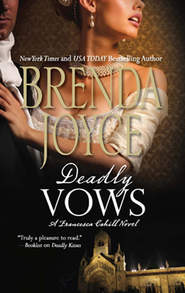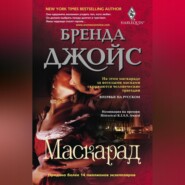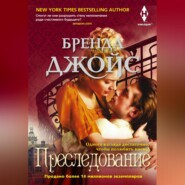По всем вопросам обращайтесь на: info@litportal.ru
(©) 2003-2025.
✖
Deadly Illusions
Автор
Год написания книги
2019
Настройки чтения
Размер шрифта
Высота строк
Поля
Maggie stared, pale, and then glanced anxiously at her children. “Margaret Cooper lived two doors down, Francesca, and Kate Sullivan lives right around the corner. Not even a block away.” She inhaled harshly. “Am I in danger?”
“None of the three victims had children,” Francesca said truthfully, although she felt that Maggie could very well be in danger. “Just keep your wits about you,” Francesca advised. “And I feel certain the children are not in danger. I believe the odds are that you are not, either. Still, we will exercise caution. Next Monday, I want you and the children to stay with me.”
Maggie started. “You mean in the mansion?”
Francesca nodded. This would not be the first time she had put up Maggie and her children in her father’s Fifth Avenue home. “The Slasher seems to be striking on Mondays, Maggie. It is just a silly precaution.” She smiled but it felt grim instead of reassuring.
Maggie hesitated, clearly torn. “I don’t want to impose,” she finally said.
Francesca took her hand. “We are friends! It is not an imposition.”
“I’ll think about it,” Maggie returned slowly. “Maybe the Slasher will be caught by then.”
“I do hope so!” Francesca cried fervently.
Maggie smiled a little, perhaps at Francesca’s passionate outburst. Carefully she gazed at the table. Not looking up, she asked softly, “Has Evan returned home?”
Francesca did not answer at first. She sat back in her chair, recalling how solicitous her brother had been toward Maggie and her children when she had been living briefly with them—and ever since. Not for the first time, she wondered if she had witnessed a romantic spark between them. But it was an impossible match—a seamstress from the Lower East Side and the son of a millionaire. Of course, Evan had recently been disowned by their father. “No, he continues to reside at the Fifth Avenue Hotel. I am so very proud of him for standing up to our father.”
“I heard he took employment,” Maggie said, her eyes still lowered.
“Yes, as a law clerk.” Society thought it unbelievable— Francesca had heard the gossip—that he would walk away from his family and his fortune.
Maggie paused. “We haven’t seen him since he came to take the children to the park last month.”
Francesca did not know what to say. “I haven’t seen him very much since he moved out. This has to be hard for him, working as a clerk and living in a hotel.”
“I supposed he is still seeing the beautiful countess Benevente?” Maggie murmured.
Francesca did not know what to say or do. Then she decided the truth was the best course. “Yes, they are often seen to gether. Evan has always gravitated toward bold women like Bartolla Benevente.”
Maggie finally looked up. “She is so beautiful. They make an astonishing couple. If he marries her, it will be a good match. Don’t you agree?” And she smiled, but it did not reach her blue eyes.
Francesca could not mistake what she was witnessing. Maggie Kennedy was fond of her brother in spite of the huge so cial gap between them. Francesca was at a loss. Even if Evan shared her feelings, it would be extremely difficult for them to make a match. But Evan did not return her feelings, clearly, as he was so thoroughly preoccupied with the beautiful countess. “Yes, it would be a socially acceptable match.” She hesitated. “But I am not sure Evan is ready to marry anyone, Maggie. Not only is he a bit of a rake, you know, but after leaving the family the way that he did, I think he needs a bit of time to reorganize his life.”
Maggie stood abruptly. “I am sure he will come home one day. I think I’ll make that tea.”
“That’s a good idea,” Francesca agreed, relieved to end the subject of her brother.
NIGHT HAD FALLEN, the day’s spring temperature suddenly gone. Francesca shivered as she stepped out onto the sidewalk, wishing she had her coat with her. Now that the workday was over, the neighborhood had come alive with the sights and sounds of its residents. Men and women were coming and going on the streets, a gang of adolescent boys was playing stickball, ignoring a heavily laden passing dray. There was tre mendous activity in a corner saloon, and many windows were open, candles burning inside. The aroma of roasting meats wafted onto the gas-lit street.
Francesca had not taken the Cahill coach downtown, and now, glancing around, she regretted it. Obviously there were no cabs in this area. If she walked four blocks, she could catch a horse-drawn omnibus crossing town and then hail a cab from Union Square. But it was dark now, and many of the passersby on the street were a rough, rowdy lot. In fact, she mused as one of a pair of brawny men passing her turned to look at her in her fine skirt and jacket, anyone could be the Slasher.
But he would not strike again until next Monday—if he chose to follow the pattern he had set.
She wished that she was not alone. Of course, she did have a small pistol in her purse. She had learned from experience to carry protection. Francesca started forward, clutching her simple black bag. Hart would murder her for being out in such a neighborhood after dark, alone and without transport.
Someone hurrying her way, a child with him, bumped into her as he passed. Francesca tensed, continuing on, when she was seized from behind. Her heart slammed with fear.
“Miss Cahill!” a woman cried, her brogue as thick as an Irish bog.
Francesca turned, relief swamping her, and met not the gaze of a man, but that of a frightened, distressed woman. An instant later she realized that Gwen O’Neil had grabbed her and that Bridget stood closely by her mother. “Mrs. O’Neil! You startled me.”
Gwen released her. Her eyes were wide in her blanched face. “I cannot believe it’s you! A friendly face—a sight for sore eyes,” she cried.
Francesca was now calm and attuned to the fact that Gwen was far more than relieved to see her. The woman looked ready to leap out of her skin from fear. She smiled at Bridget and instantly realized that the eleven year old knew all about her neighbor’s murder. She stood stiff and frozen beside her mother, her eyes huge in her small face. “Mrs. O’Neil,” she began, smiling and hoping to calm them both. But this was an opportunity not to be missed. Never mind that she was terribly late for her mother’s dinner party—she would see these two safely home and catch a brief interview. Or perhaps even a substantial one, at that.
But Gwen jumped as if she had caught on fire, glancing wildly around her, her eyes huge with fear. Francesca took her arm. “Mrs. O’Neil? What is it? What’s wrong?”
Gwen’s dark eyes met hers. She opened her mouth but no sound came out.
Bridget was the one who spoke. Tears thickened her voice. “We’re bein’ followed,” she cried.
CHAPTER TWO
Tuesday, April 22, 1902 7:00 p.m.
FRANCESCA GLANCED AROUND but saw nothing amiss. Men and women continued to pass on their way home after a long day’s work and the boys continued to slam the ball around in the cobbled street with their sticks. She faced Gwen grimly. “Let me take you up to your flat,” she said.
“Would you?” Gwen cried in obvious relief.
Francesca took her arm. “Let’s go,” she said kindly. As Bridget preceded them, she glanced over her shoulder one more time. She half expected to see the Slasher standing against the tall iron street lamp, watching them. But nothing on the street had changed.
There was no light in the small entry hall, and the stairs were also dark with shadow, but that was not unusual in these terri ble tenements. “I assume there are no gaslights?”
“No,” Gwen breathed, fumbling in her shopping bag. “But I have a candle and matches.”
Francesca carried a candle and matches as well, but she waited for the other woman to light the wick. Gwen’s hands were shaking so badly, though, that Francesca took the candle and match from her, struck a spark and lit it. Instantly the small, grim entry was illuminated. Someone had hung a cracked mirror on one peeling wall in a futile attempt at decoration. “Let’s go, Bridget,” she said with false cheer, shivering.
They hurried upstairs in single file, the steps creaking beneath their feet. Gwen and her daughter lived on the second floor, as had Margaret Cooper. When they passed Margaret’s flat, Francesca saw that the door was padlocked, meaning that the police had left. The sign Police Line had been nailed to the door. When she and Bragg had left the flat together, a photographer had just arrived. Bragg had conceived of the singular notion of photographing the victim and the crime scene for reference during the investigation. It was a brilliant idea.
Gwen unlocked the door, her hands continuing to tremble. The moment they were all inside, she said tersely, “Bridget, light another candle,” as she quickly bolted the door behind them.
Francesca wondered how she was going to live in such a state of fear. She studied her from behind as the other woman turned, managing a smile and unpinning her straw hat. instantly, her hair tumbled down.
Francesca stiffened. She already knew that Gwen had dark red hair, but now she was struck by the fact that it was almost waist length, rather curly, and very much like the hair of Margaret Cooper. And while Gwen and Margaret did not look at all alike—Margaret had been pretty but in a soft way, and Gwen was striking—the similarity between them now was unmistakable. And Gwen lived next door to Margaret….
“You’re staring,” Gwen breathed.
“I’m sorry. I know you found your neighbor, Mrs. O’Neil. I am so sorry. It must have been terrible.” Behind her, another candle flamed to life, illuminating the long, single room more drastically.
Gwen nodded. “It was terrible,” she whispered. She put her hat on a peg and her wool shawl followed. She wore a simple print blouse and dark skirt. As she leaned over, Francesca realized she was taking off her shoes. Once in her stocking feet, she turned with a small smile. “My feet hurt,” she whispered.
Francesca guessed that her shoes were not store-bought and were either too small or had holes in the soles. Then, as she heard water running at the kitchen sink, she thought about the bucket of water she had seen in front of the sofa in Margaret’s apartment. Had she had sore feet, too? Had she been soaking her feet before her murder? Was that how the killer had caught her?
She smiled at Gwen. “Please, do not mind me. Are you certain that you were being followed?”
Gwen hesitated and then moved to the small square table covered with a bright yellow tablecloth. A chipped glass was in its center, a single daisy there. She gripped the back of one chair. Bridget was lighting the stove and setting a pot of water to boil. “No. I mean, I’m not certain—but I am sure of it!”

















